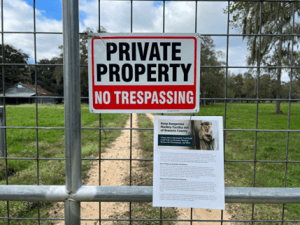Pressure From PETA and Local Residents Deals Blow to Charles River’s Plan for Texas Monkey Prison
For Immediate Release:
November 28, 2023
Contact:
Tasgola Bruner 202-483-7382
PETA and local residents scored a victory today against the monkey-importation industry when Brazoria County commissioners voted to support a resolution recommending that state and federal authorities not issue permits to build a proposed concrete monkey facility on environmentally sensitive land. The vote was unanimous and follows a full-court press from PETA and residents who live in the area.
“PETA applauds Brazoria County officials for taking the first step to block this ethical, public health, and ecological disaster,” says PETA primate scientist Dr. Lisa Jones-Engel. “Federal officials, along with those from the state of Texas, should follow their lead and stop this tragedy from unfolding.” In the past few days, PETA sent 4,000 letters to county residents alerting them to the dangers of the massive monkey-importation and breeding warehouse that Charles River Laboratories, under the incorporated name Kandurt LLC, proposes to build on more than 500 acres of ecologically sensitive land with old-growth forest. The property targeted for the facility borders land owned and protected by the U.S. Fish & Wildlife Service, The Nature Conservancy, and the San Bernard National Wildlife Refuge.

The site of the proposed monkey facility on environmentally sensitive land. Credit: PETA
Several local residents spoke in opposition to the facility at the meeting today, including a veterinarian, a drainage district director, a wildlife rehabber, directors of conservation organizations, and a spokesperson for the city of Sweeny. Jones-Engel also spoke at the commissioners’ November 14 meeting about the dangers that the facility could pose to both humans and other animals in the area. The proposed facility would generate mountains of biological waste and introduce monkeys’ saliva, blood, and other bodily fluids into the environment, and animals imported into the U.S. by Charles River have carried deadly diseases that can spread to humans and other animals. Monkeys involved in the wildlife trade for experimentation are known to carry and transmit a slew of nasty pathogens and diseases, including herpes B virus, tuberculosis, Ebola-like viruses, simian hemorrhagic fever virus, shigellosis, salmonellosis, Campylobacter, malaria, and dengue. There’s also concern that monkeys could escape, which has happened at other primate laboratories in Texas.
Charles River is already a top importer of monkeys into the U.S. and experiments on more of them than any other company—including 16,000 monkeys in 2022 alone. Charles River is currently under federal investigation over the alleged illegal smuggling of long-tailed macaques, an endangered species, from Asia to sell to U.S. laboratories.
PETA—whose motto reads, in part, that “animals are not ours to experiment on”—opposes speciesism, a human-supremacist worldview. For more information on PETA’s investigative newsgathering and reporting, please visit PETA.org, listen to The PETA Podcast, or follow the group on X (formerly Twitter), Facebook, or Instagram.


